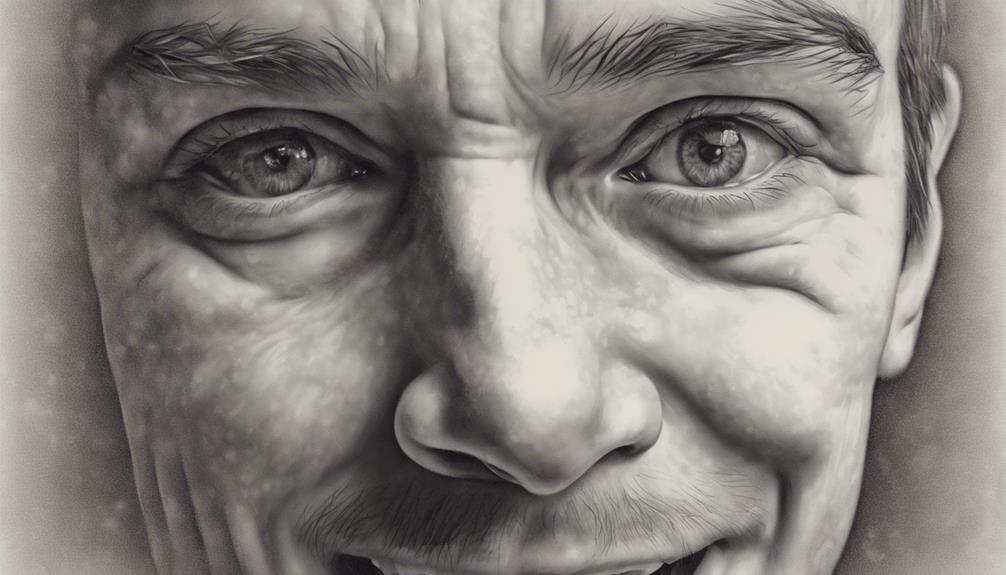When faced with a covert narcissist's apology, it can feel like receiving a beautifully wrapped box, only to find it empty upon opening. The facade of remorse often masks a shallow attempt at manipulation and self-preservation.
But what lies beneath this polished surface of words and seemingly heartfelt expressions? Let's peel back the layers to uncover the intricate web of deceit woven within these seemingly apologetic gestures.
Key Takeaways
- Covert narcissists' apologies shift blame, lack sincerity, and manipulate emotions.
- Apologies from covert narcissists often evade full accountability and maintain control.
- Victims of covert narcissists' apologies experience confusion, manipulation, and emotional harm.
- Recognizing manipulation tactics, setting boundaries, and prioritizing self-care are crucial when dealing with covert narcissists' apologies.
The Circle Apology
The Circle Apology tactic, employed by covert narcissists, ensnares individuals by initially appearing genuine before swiftly shifting blame onto them. This insidious behavior starts with what seems like a sincere apology, only to quickly transition into the manipulative act of making the victim feel responsible for the narcissist's actions.
As the blame shifting occurs, the victim is left bewildered and unsure about their own actions, ultimately leading them to apologize for things they didn't do. This cycle of manipulation leaves individuals questioning their own reality and feeling trapped in a web of confusion crafted by the covert narcissist.
The Victim Apology

Playing the victim, covert narcissists strategically deploy insincere apologies to manipulate emotions and maintain a facade of innocence. These victim apologies are calculated moves aimed at shifting blame onto the recipient for not forgiving them, further entrenching their manipulative behavior. The lack of genuine remorse in these apologies makes them lose credibility over time, revealing the covert narcissist's true intentions. By deflecting attention away from their harmful actions, these apologies serve the narcissist's interests rather than fostering genuine reconciliation.
| Manipulate Emotions | Shift Blame | Deflect Attention |
|---|---|---|
| Covert narcissists use victim apologies to evoke sympathy and manipulate emotions. | They often deflect blame onto the recipient, making them feel responsible for not accepting the apology. | Victim apologies serve to divert attention from the narcissist's harmful behavior, maintaining their facade of innocence. |
The Partial Apology
Shifting focus from manipulating emotions through victim apologies, covert narcissists employ partial apologies as a tool to evade full accountability and maintain their sense of superiority. This strategic approach allows them to control the narrative by acknowledging only certain aspects of their wrongdoing while deflecting blame onto others. By offering a partial apology, covert narcissists create an illusion of remorse without truly taking responsibility for their actions. This selective remorse serves their agenda of preserving their self-image as faultless and in control.
Victims of partial apologies often find themselves in a state of confusion as they grapple with the mixed signals presented. The covert narcissist's use of partial apologies isn't rooted in genuine remorse but rather in the manipulation of emotions to further their own interests. This calculated tactic enables them to sidestep addressing the core issues at hand, perpetuating a cycle of control and evasion of true accountability.
The Abusive Apology

Navigating an abusive apology from a covert narcissist requires a keen awareness of the manipulative tactics employed to maintain control and deflect accountability. This type of apology is far from genuine and is characterized by blame-shifting and personal attacks aimed at the recipient. The covert narcissist refuses to take full responsibility and instead uses the apology as a tool for manipulation, ensuring they remain in control of the situation. The recipient is put in a defensive position, forced to justify themselves and often ending up feeling guilty or confused.
To illustrate the dynamics of an abusive apology further, we can examine the following table:
| Manipulative Tactic | Description | Example |
|---|---|---|
| Blame-Shifting | Shifting responsibility onto the recipient | "If you hadn't done that, I wouldn't have reacted that way." |
| Personal Attacks | Attacking the recipient's character or actions | "You always make me behave like this." |
| Deflecting Accountability | Avoiding taking full responsibility | "I'm sorry you feel that way, but you made me do it." |
Recognizing these manipulative strategies is crucial in breaking free from the cycle of emotional abuse perpetuated by a covert narcissist's abusive apologies.
The Absolute Refusal to Apologize
In relationships with covert narcissists, the absolute refusal to apologize showcases a lack of genuine remorse and a consistent pattern of deflecting blame onto the victim. This refusal to apologize demonstrates a profound lack of empathy and an unwillingness to take responsibility for one's actions. Victims of covert narcissists may feel invalidated, unimportant, and manipulated when faced with this refusal to acknowledge wrongdoing.
The refusal to say 'I'm sorry' can leave individuals feeling unheard, dismissed, and emotionally drained, perpetuating a cycle of hurt and confusion within the relationship. Covert narcissists often use fake apologies as a means of manipulation, further damaging trust and communication. Seeking support from a therapist can be beneficial for individuals dealing with a covert narcissist's refusal to apologize, as it can help navigate complex emotions, set boundaries, and work towards healing from the detrimental effects of this behavior.
Frequently Asked Questions
How Does a Covert Narcissist Apologize?
When a covert narcissist apologizes, they often employ manipulative tactics to evade true accountability. Their apologies lack sincerity, focusing more on self-preservation than genuine remorse.
By shifting blame, denying wrongdoing, and using gaslighting techniques, they aim to maintain control and manipulate others. Red flags include vague apologies that prioritize their feelings over acknowledging the harm caused.
It's crucial to recognize these patterns to protect oneself from emotional manipulation.
How Do You Know if a Narcissist Is Really Sorry?
When a narcissist is truly sorry, their actions speak louder than words. We observe genuine efforts at change and growth, not just empty promises.
They take concrete steps to make amends and show empathy towards those they've hurt. It's about consistent behavior over time, not just a one-time apology.
True remorse involves accountability and a willingness to repair the damage caused, demonstrating a genuine desire to improve and make things right.
What Makes a Covert Narcissist Cry?
When a covert narcissist cries, it often serves as a manipulative tactic to evoke sympathy or deflect accountability. These tears are a calculated move to maintain their victim facade and control those around them.
Understanding the motives behind their tears can help in recognizing the emotional manipulation at play. It's crucial to remain vigilant and not let these displays of emotion cloud judgment when dealing with a covert narcissist.
What Happens After a Narcissist Apologizes?
After a narcissist apologizes, it's crucial to remain vigilant. Although the apology might seem sincere, it's essential to evaluate their actions following it.
Observing if they make meaningful changes and show consistent empathy towards others can provide insight into the genuineness of their apology. Trusting but verifying their words through ongoing behaviors helps navigate potential manipulative tactics and safeguard emotional well-being from further harm.
Conclusion
In conclusion, a covert narcissist's apology can be likened to a poisoned apple, tempting on the outside but toxic within.
It may appear sweet and sincere at first glance, but upon closer inspection, reveals a manipulative and self-serving nature.
It's important to recognize the red flags and protect oneself from falling into the trap of false remorse and empty promises.









